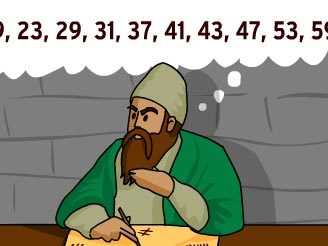Almost prime
 How many numbers between 2000 and 3000 have exactly 3 factors?
How many numbers between 2000 and 3000 have exactly 3 factors?
This section requires Javascript.
You are seeing this because something didn't load right. We suggest you, (a) try
refreshing the page, (b) enabling javascript if it is disabled on your browser and,
finally, (c)
loading the
non-javascript version of this page
. We're sorry about the hassle.
1 solution
interesting!
Excuse me but seriously what the hell is that question?!!?! Can you yourself read what you just wrote?I mean no offence but you really should study a bit more English before posting a nonsensical problem.
Log in to reply
Brother, you are right. I need to improve my English grammar. By the way I am maths teacher not English.
Log in to reply
I'm not saying that you are an English teacher or anything but seriously you have to be good enough to be able to post a "READABLE" problem.I've read your question over and over again for like 10 times and I don't really understand anything from that.
Log in to reply
@Arian Tashakkor – ok, question is: how many numbers between 2000 & 3000 have exactly three factors. hope you understand.
Log in to reply
@Abid Junaid – Three factors besides 1 and themselves or inclusive?
Log in to reply
@Arian Tashakkor – In general, the term "factor" of a positive number n refers to all the positive divisors of n , including 1 and n itself.
If the factors besides 1 and n are to be considered, then the term used for those factors is "proper factor". I don't see anything wrong with the wording of this problem (assuming that he hasn't edited it since).
Log in to reply
@Prasun Biswas – Well you didn't see what it looked like initially and believe me , you wouldn't wanna see that ...
@Arian Tashakkor – inclusive, that is what, I want to explain in question.
Log in to reply
@Abid Junaid – In that case you're correct.I highly recommend you edit your question.
I agree this question should be edited. In practice, when asked to find the factors of a composite number, one would never consider 1 or the number itself. For example, the factors of 6 are 2 and 3. To be fair, this isn't the only question I have seen that is vaguely worded in this way. Some authors use "factor" to mean "prime factor," so that the number 24 would have two factors (2 and 3), where others would use it in the way that allows composite numbers as factors as well. This is just an example of why it is so important to be precise when writing maths.
square of a prime have only three factors. 1, prime no ,square of prime no. e.x. 49 (square of a 7) have exactly three factors. 1 , 7 ,49.
so between 2000 & 3000 only two number 2209 & 2809 (square of 47 & 53) are there . so correct answer is 2 number.